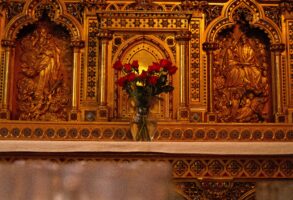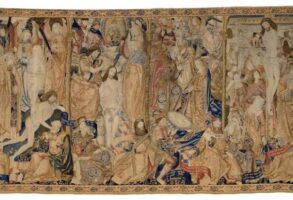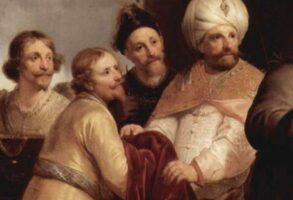Published May 4, 2016
In the following interview with Kathryn Jean Lopez of National Review Online, EPPC Fellow Stephen P. White discusses his new book Red, White, Blue, and Catholic.
A lot of people went to sleep Tuesday night or woke up Wednesday morning wondering what to do. Neither presumptive candidate for the major political parties appears acceptable to many people of conscience. What this amounts to is a wake-up call and an opportunity to get serious about politics as a noble pursuit that requires loving devotion on every level. In Red, White, Blue, and Catholic, Stephen P. White of the Ethics and Public Policy Center presents an accessible guidebook to approaching citizenship boldly, coherently, and even courageously — and certainly not just on the presidential level. We talk more. – KJL
KATHRYN JEAN LOPEZ: Are Catholics to blame for our current politics? Especially if it’s true that “being Catholic doesn’t seem to make much of a difference in how we vote”?
STEPHEN P. WHITE: Not any more than the rest of America is to blame. America’s 70-odd million Catholics vote in a way that is virtually indistinguishable from the rest of the country. Catholics are divided along many of the same ideological and political lines that we see in the rest of the nation.
LOPEZ: What on earth is a Catholic to do this election cycle?
WHITE: Strive to be wise as serpents and innocent as doves. Despairing of politics because one finds both likely nominees repugnant strikes me as irresponsible. It’s certainly not helpful. Not to downplay the importance of this election, but most of the work of citizenship doesn’t involve voting. That’s important to remember when the RealClearPolitics poll averages make the hair on the back of your neck stand up. It’s one of the reasons I wrote this book.
LOPEZ: Can American Catholics be good citizens? Why must we ask this question today?
WHITE: It’s a perennial question: Can Christians be good citizens? The author of the second century “Letter to Diognetus” addressed this question. Three centuries later, St. Augustine wrote City of God largely in response to the same question. In American history, the question has been asked more specifically of Catholics, for a variety of reasons. At its heart, the question is about the nature and scope of the political good: Is the good of the political community compatible with Christian claims about the nature and destiny of the human person?
Catholics should relish the chance to address that question because it gets to the very heart of the faith. If God became man, then that radically changes the horizon against which we understand humanity itself.
LOPEZ: What does it mean to be a good citizen in 2016?
WHITE: Citizenship is more than a collection of certain rights (though it certainly entails rights); it is membership in, and therefore responsibility for, a particular community. Good citizenship means willing and acting for the good of that community.
LOPEZ: You write that “most of how we live as Catholic citizens doesn’t happen in the voting booth. Most of the ways in which we shape our nation happen elsewhere.” Does that let Catholics off the hook in November?
WHITE: Not really. I think one danger which arises from our politics of permanent crisis is the temptation to think that if we could just get people to vote the right way, and therefore have the right people in government, everything would take care of itself. Needless to say, having the “right people” winning elections is hardly a sufficient condition for a flourishing republic.
The health of the republic depends upon our being a people possessed of certain virtues. The cultivation of those virtues — those habits which enable us to live our freedom well — is primarily the work of civil society. Government can help a little, and hinder a lot. But most of the work of forming citizens falls to families, schools, churches, businesses, and so on. The Founders understood this. Alexis de Tocqueville saw this. We lose sight of it at our own risk.
LOPEZ: What are the “citizen saints” you say we need? Do you know any of them?
WHITE: We all need examples of lives well lived, even when, perhaps especially when, those examples make us uncomfortable and spur us to change.
Now, if we assume that the character of our nation is precisely what it ought to be, then saints are disruptive and unwelcome. But if we take a more circumspect view of the social or political status quo, then saints are disruptive and very welcome indeed.
LOPEZ: What is Catholic social teaching? Ought it be a guide to people other than Catholics?
WHITE: Catholic social teaching is a tradition of philosophical and theological reflection on the social nature of the human person and all its economic, political, and cultural implications. All of this is accessible to men and women of good will, provided they don’t insist on the incompatibility of faith and reason.
I want to highlight this point: Catholic social teaching is first and foremost about who and what we are. It is emphatically not simply a bundle of moral prescriptions and prohibitions touching on questions of social policy.
The first thing the Church has to say about our humanity is that we are created by God, in His image and likeness (we are rational, free, and responsible). The second is that we are created for communion, with others and with God. These two truths — which find their fulfillment in the Mystery of the Incarnation and the person of Jesus Christ — are the basis for the Church’s insistence on human dignity, human rights, our social nature, both the freedom and responsibility of individuals, the irreplaceable need for solidarity, and the importance of a proper ordering of the various levels of society (subsidiarity), all of which contributes to the common good.
LOPEZ: The Little Sisters of the Poor are at the Supreme Court and yet people don’t seem to be alarmed about the present and future of religious liberty in America. What do you make of this? How might we make a more convincing case?
WHITE: My sense is that people don’t care more about cases such as the Little Sisters of the Poor because they don’t think covering birth control is a big deal. Which is to say, much of the country has bought into the Left’s narrative that the HHS-mandate fight is about access to birth control rather than religious freedom.
Those of us who are alarmed by the threats to religious freedom need to make the case for religious freedom vocally and forcefully. Crucially, we must make the case that religion is a positive public good, not just a private dispensation tolerated by the state. To concede the latter is to concede that the only true limits on government are those it deigns to impose upon itself.
LOPEZ: Why should your atheist liberal next door care about you and your family growing in faith?
WHITE: Because a world in which power — political, scientific, economic — is the ultimate horizon of the human experience is a miserable, nasty sort of world to live in. The sorrows of a God-haunted world are deeper, but the joys are much richer. For the believer, the stakes of this life are much greater — because what we do here matters for eternity. Ultimately it’s this inter-generational awareness — of our mortality and also what Hannah Arendt called our “natality” — that makes civilization both possible and fragile.
LOPEZ: How has the family become a “political football”? How does this hurt it more? What can be done about it?
WHITE: We live in a world in which the following are politically controversial statements: “Children have a mother and a father”; “there are essential, biological differences between men and women”; “the begetting and rearing of children is an essential part of the institution of marriage”; “the union of a man and women forms the necessary foundation of family.” I could go on, but the point is, I think, clear.
LOPEZ: The pope came and went this fall as people went batty over Laudato Si’ almost a year ago now, not to mention his recent document on the family, Amoris Laetitia. And yet — can he help?
WHITE: If we’re waiting for the pope (this pope or any other) to do or say something that will solve our problems for us, we’re deluding ourselves. The work of citizenship is ours; no one else can do it for us.
LOPEZ: Did you have a favorite moment of that trip?
WHITE: Pope Francis leading the seminarians of the Archdiocese of Philadelphia in singing “Happy Birthday” to Archbishop Charles Chaput.
LOPEZ: Is the pope a socialist?
WHITE: No. He is perhaps some sort of Peronist. He does seem to have certain political biases — who doesn’t — but I don’t think political ideology as such explains very much about him.
LOPEZ: You write that “the poor are not a problem to be solved or a burden to be borne. They are people with all the dignity that entails.” How does that play out in politics? How does that play out in our daily lives?
WHITE: We have a tendency to view questions of social policy through an exclusively economic lens. It might sound strange to say this, but thinking about poverty in purely material terms — that is in terms of distribution and efficient allocation of goods — while obviously important, is insufficient. Relative poverty is no more an unmitigated evil than wealth is an unmitigated good.
LOPEZ: “A democracy without values easily turns into open or thinly disguised totalitarianism.” Do you see that on the horizon?
WHITE: Well the possibility is always there. This line is from Pope John Paul II, but the basic point has been made throughout history — from Plato to Lincoln. Lincoln’s first public address — his Lyceum Address — took up the problem of maintaining our political institutions through time. Freedom untethered from truth becomes self-cannibalizing: Freedom becomes license and we end up enslaved — first to our passions, and then, perhaps, by one another. Tocqueville, of course, warned about soft despotism and it’s hard not to see that in America today.
The “weaponized” version of sexual-identity politics that we’ve seen in recent years is tremendously worrying. The scorched earth approach to politics and the utter rejection of the kinds of natural limits and social norms upon which civil society depends is precisely the kind of freedom that ends up destroying itself.
— Stephen P. White is a fellow at the Ethics and Public Policy Center. Kathryn Jean Lopez is a senior fellow at the National Review Institute and an editor-at-large of National Review Online. She is co-author of the updated How to Defend the Faith without Raising Your Voice.











